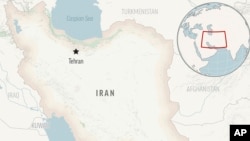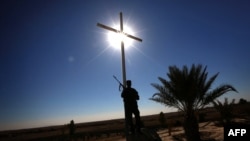
Iran's Supreme Court has upheld a death sentence imposed on a member of the all-volunteer wing of the country's paramilitary Revolutionary Guard who stormed a house during the 2022 protests over the death of Mahsa Amini and killed a 60-year-old man, a lawyer said Tuesday.
The sentence imposed on the Basij member marks a rare moment for Iran to hold accountable its security forces, who waged a bloody, monthslong crackdown on all dissent over Amini's death. More than 500 people were killed and more than 22,000 were detained.
Since then, Iran has put to death multiple protesters who were detained in the crackdown and accused of killing security forces, after closed-door trials criticized by activists abroad.
Lawyer Payam Derafshan, who represented a protester detained in 2022, told The Associated Press that the Supreme Court reached its verdict on August 26 over the killing of Mohammad Jamehbozorg, a carpet seller in the city of Karaj.
The convicted Basij member and others stormed Jamehbozorg's home in Karaj, some 40 kilometers northwest of the capital, Tehran, looking for demonstrators taking part in the Amini protests, including his son. The Basij member, identified only by initials, shot Jamehbozorg in the head, killing him.
Two other Guard members also received prison sentences. Iran's government and state media did not report the ruling.
Amini, 22, died after being arrested by Iran's morality police over allegedly improperly wearing her hijab, or headscarf. In March, a United Nations fact-finding mission said Iran was responsible for the "physical violence" that led to Amini's death and concluded that Tehran committed "crimes against humanity" through its actions in suppressing the protests.
There has been another case of a security force member receiving the death penalty over a killing in the Amini protests. In 2023, a military court sentenced Colonel Jafar Javanmardi, the police chief of northern port city of Bandar Anzali, for killing a young man while not observing the country's laws related for using live ammo.
The Supreme Court is still reviewing Javanmardi's initial death sentence.
Cases involving security forces accused of brutality have been a particular focus of Iran's new reformist President Masoud Pezeshkian. Last week, Pezeshkian ordered an investigation into the death of a man in custody after activists alleged he had been tortured to death by police officers.







